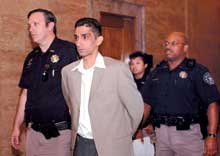ALKHOBAR, 30 October 2003 — At the age of 25, his life is effectively over. On Monday a Denver, Colorado jury found Naif I. Al-Yousif guilty of first-degree murder in connection with the death of a fellow Saudi student, Abdul Aziz Al-Koohaji, in January 2001. On Jan. 5, 2004, Denver District Court Judge Gloria Rivera will hand down a mandatory sentence to Al-Yousif of life in prison without parole. Until that time he has been returned to his cell in the Denver County Jail. Al-Yousif’s attorney, Gary Lozow, has indicated that he will file an appeal.
Lynn Kimbrough, communications director, Denver District Attorney’s Office, stated that after sentencing Al-Yousif will be referred to the Colorado Prison Authority’s Diagnostic and Reception Center. There it will be determined which maximum security facility best matches his long-term needs while still maintaining the security required in the incarceration of a first-degree murderer. All maximum security facilities in Colorado are located in rural areas of the state. At least initially, Al-Yousif will probably be locked in his cell 23 hours per day.
“The jury was not capricious in returning the guilty verdict,” said Kimbrough. “They deliberated for nearly two full days. In my experience jurors take their responsibility very seriously, especially when sentencing a man to life behind bars.”
The guilty verdict was the latest act in a terrible case, which has resulted in victory for no one.
“We can see that there are victims all around in this case,” said Kimbrough. “Abdul Aziz and his family are the obvious ones. But we also recognize that Al-Yousif’s parents and his extended family, as well as society as a whole, are victims too.”
In Alkhobar the community has been traumatized by the Al-Koohaji murder. Locals are shocked that three young men from good families could kill a friend. Perhaps it is not surprising though that Al-Yousif, Mishal Al-Swaidi and Tariq Al-Dossary should resort to violence. All three showed signs in adolescence of seriously troubled personalities. There is evidence that in the United States they turned to illegal drug use.
“In our Arab culture we give children an overwhelming amount of care and support. In many ways, Arab teenagers are like babies,” said Dr. Muhammad Riyad, consultant psychiatrist, Saad Specialist Hospital. “Then these teens graduated from high school and they were shipped off to universities abroad. It was like kicking them out of home and culture. It was a traumatic action. Many young Arabs do not have the skills to cope with such a crisis. This puts them at high risk for problems in the new environment.”
Dr. Riyad explained that the most serious psychiatric illnesses tend to occur during adolescence. Teenagers repress emotion and thought and act aggressively. Without adequate social support, if given the chance, they turn to illegal drugs to help create a different reality and provide fantasy and relaxation.
“The role of the family must be to keep the relationship strong, even from a distance,” said Dr. Riyad. “Constant communication is essential. Adolescents rarely ask for help when they are troubled, but if young Arabs abroad are monitored closely, then the family can intervene at the first sign of trouble. Remember that Naif Al-Yousif was only 22 years old when he committed the murder. There was certainly personal culpability but we must also question what the other factors were that led him to such an act.
“I have treated many young Arabs who suffered their first acute psychotic episodes while studying at prestigious universities outside the Middle East,” Dr. Riyad said. “They couldn’t adjust to the new environment. They returned to their homes broken. This latest tragedy should serve as a lesson and warning to our society.”


